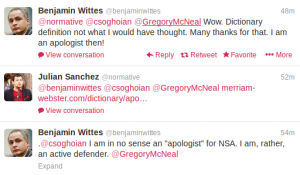Did OLC Rule Americans Have Voluntarily Allowed NSA to Collect Their Communications Domestically?
Some weeks ago, I waded into a discussion between Charlie Savage and Ben Wittes to suggest that a still-secret OLC opinion Ron Wyden mentioned back in January might serve as the basis for collecting US person communications at the phone switches.
In his letter to John Brennan in January asking for a slew of things, Ron Wyden mentioned two opinions that may be the still-secret legal analysis mentioned by Savage.
Third, over two years ago, Senator Feingold and I wrote to the Attorney General regarding two classified opinions from the Justice Department’s Office of Legal Counsel, including an opinion that interprets common commercial service agreements. We asked the Attorney General to declassify both of these opinions, and to revoke the opinion pertaining to commercial service agreements. Last summer, I repeated the request, and noted that the opinion regarding commercial service agreements has direct relevance to ongoing congressional debates regarding cybersecurity legislation. The Justice Department still has not responded to these letters.
The opinions would have to pre-date January 14, 2011, because Feingold and Wyden requested the opinions before that date.
The reason I think the service agreements one may be relevant is because the opinions Ben cites focus on whether government users have given consent for EINSTEIN surveillance; in his article on it Bradbury focuses on whether the government could accomplish something similar with critical infrastructure networks.
I suspect this opinion — whatever question it addresses — makes the case that Americans have given NSA voluntary permission to collect US person communications from certain (I’m not sure which ones) switches.
Whatever it says, though, Ron Wyden just asked for the opinion again.
Over the last few years I have written multiple letters to Attorney General Holder regarding a particular opinion from the Justice Department’s Office of Legal Counsel that interprets common commercial service agreements. I have said that I believe that this opinion is inconsistent with the public’s understanding of the law, and that it needs to be both withdrawn and declassified. Despite multiple follow-ups from my staff I still have not received a response to any of these letters. Can you tell me when I can expect a response?
The biggest reason public understanding of the law would matter, after all, is if OLC were interpreting it to reflect voluntary consent for collection of data that the public didn’t realize they had given. And we know NSA wants to — if it is not already — scan communications for malicious code in the name of cybersecurity on critical infrastructure networks the same way it is doing on government networks.
Remember, this is one of 4 questions Wyden would have asked had DiFi allowed an elected Senator to ask questions rather than an NSA apologist to appear. Wyden had apparently alerted Keith Alexander to what those questions were.
Heck, this is even a question aplogist Ben Wittes has expressed an interest in. For once it is his questions, in addition to members of Congress, that are not getting answered.


